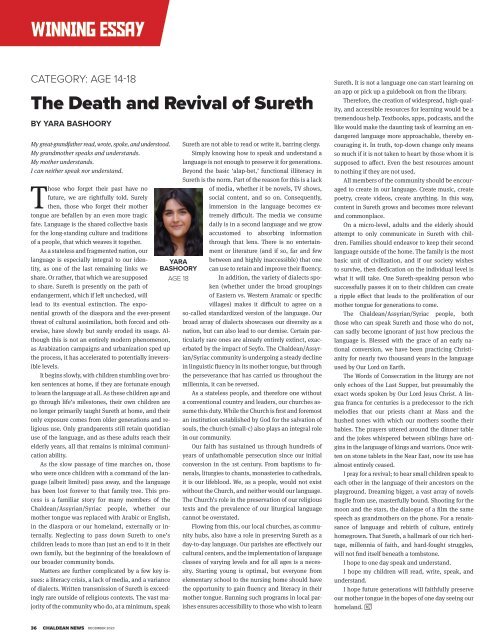Create successful ePaper yourself
Turn your PDF publications into a flip-book with our unique Google optimized e-Paper software.
WINNING ESSAY<br />
CATEGORY: AGE 14-18<br />
The Death and Revival of Sureth<br />
BY YARA BASHOORY<br />
My great-grandfather read, wrote, spoke, and understood.<br />
My grandmother speaks and understands.<br />
My mother understands.<br />
I can neither speak nor understand.<br />
Those who forget their past have no<br />
future, we are rightfully told. Surely<br />
then, those who forget their mother<br />
tongue are befallen by an even more tragic<br />
fate. Language is the shared collective basis<br />
for the long-standing culture and traditions<br />
of a people, that which weaves it together.<br />
As a stateless and fragmented nation, our<br />
language is especially integral to our identity,<br />
as one of the last remaining links we<br />
share. Or rather, that which we are supposed<br />
to share. Sureth is presently on the path of<br />
endangerment, which if left unchecked, will<br />
lead to its eventual extinction. The exponential<br />
growth of the diaspora and the ever-present<br />
threat of cultural assimilation, both forced and otherwise,<br />
have slowly but surely eroded its usage. Although<br />
this is not an entirely modern phenomenon,<br />
as Arabization campaigns and urbanization sped up<br />
the process, it has accelerated to potentially irreversible<br />
levels.<br />
It begins slowly, with children stumbling over broken<br />
sentences at home, if they are fortunate enough<br />
to learn the language at all. As these children age and<br />
go through life’s milestones, their own children are<br />
no longer primarily taught Sureth at home, and their<br />
only exposure comes from older generations and religious<br />
use. Only grandparents still retain quotidian<br />
use of the language, and as these adults reach their<br />
elderly years, all that remains is minimal communication<br />
ability.<br />
As the slow passage of time marches on, those<br />
who were once children with a command of the language<br />
(albeit limited) pass away, and the language<br />
has been lost forever to that family tree. This process<br />
is a familiar story for many members of the<br />
Chaldean/Assyrian/Syriac people, whether our<br />
mother tongue was replaced with Arabic or English,<br />
in the diaspora or our homeland, externally or internally.<br />
Neglecting to pass down Sureth to one’s<br />
children leads to more than just an end to it in their<br />
own family, but the beginning of the breakdown of<br />
our broader community bonds.<br />
Matters are further complicated by a few key issues:<br />
a literacy crisis, a lack of media, and a variance<br />
of dialects. Written transmission of Sureth is exceedingly<br />
rare outside of religious contexts. The vast majority<br />
of the community who do, at a minimum, speak<br />
YARA<br />
BASHOORY<br />
AGE 18<br />
Sureth are not able to read or write it, barring clergy.<br />
Simply knowing how to speak and understand a<br />
language is not enough to preserve it for generations.<br />
Beyond the basic ‘alap-bet,’ functional illiteracy in<br />
Sureth is the norm. Part of the reason for this is a lack<br />
of media, whether it be novels, TV shows,<br />
social content, and so on. Consequently,<br />
immersion in the language becomes extremely<br />
difficult. The media we consume<br />
daily is in a second language and we grow<br />
accustomed to absorbing information<br />
through that lens. There is no entertainment<br />
or literature (and if so, far and few<br />
between and highly inaccessible) that one<br />
can use to retain and improve their fluency.<br />
In addition, the variety of dialects spoken<br />
(whether under the broad groupings<br />
of Eastern vs. Western Aramaic or specific<br />
villages) makes it difficult to agree on a<br />
so-called standardized version of the language. Our<br />
broad array of dialects showcases our diversity as a<br />
nation, but can also lead to our demise. Certain particularly<br />
rare ones are already entirely extinct, exacerbated<br />
by the impact of Seyfo. The Chaldean/Assyrian/Syriac<br />
community is undergoing a steady decline<br />
in linguistic fluency in its mother tongue, but through<br />
the perseverance that has carried us throughout the<br />
millennia, it can be reversed.<br />
As a stateless people, and therefore one without<br />
a conventional country and leaders, our churches assume<br />
this duty. While the Church is first and foremost<br />
an institution established by God for the salvation of<br />
souls, the church (small-c) also plays an integral role<br />
in our community.<br />
Our faith has sustained us through hundreds of<br />
years of unfathomable persecution since our initial<br />
conversion in the 1st century. From baptisms to funerals,<br />
liturgies to chants, monasteries to cathedrals,<br />
it is our lifeblood. We, as a people, would not exist<br />
without the Church, and neither would our language.<br />
The Church’s role in the preservation of our religious<br />
texts and the prevalence of our liturgical language<br />
cannot be overstated.<br />
Flowing from this, our local churches, as community<br />
hubs, also have a role in preserving Sureth as a<br />
day-to-day language. Our parishes are effectively our<br />
cultural centers, and the implementation of language<br />
classes of varying levels and for all ages is a necessity.<br />
Starting young is optimal, but everyone from<br />
elementary school to the nursing home should have<br />
the opportunity to gain fluency and literacy in their<br />
mother tongue. Running such programs in local parishes<br />
ensures accessibility to those who wish to learn<br />
Sureth. It is not a language one can start learning on<br />
an app or pick up a guidebook on from the library.<br />
Therefore, the creation of widespread, high-quality,<br />
and accessible resources for learning would be a<br />
tremendous help. Textbooks, apps, podcasts, and the<br />
like would make the daunting task of learning an endangered<br />
language more approachable, thereby encouraging<br />
it. In truth, top-down change only means<br />
so much if it is not taken to heart by those whom it is<br />
supposed to affect. Even the best resources amount<br />
to nothing if they are not used.<br />
All members of the community should be encouraged<br />
to create in our language. Create music, create<br />
poetry, create videos, create anything. In this way,<br />
content in Sureth grows and becomes more relevant<br />
and commonplace.<br />
On a micro-level, adults and the elderly should<br />
attempt to only communicate in Sureth with children.<br />
Families should endeavor to keep their second<br />
language outside of the home. The family is the most<br />
basic unit of civilization, and if our society wishes<br />
to survive, then dedication on the individual level is<br />
what it will take. One Sureth-speaking person who<br />
successfully passes it on to their children can create<br />
a ripple effect that leads to the proliferation of our<br />
mother tongue for generations to come.<br />
The Chaldean/Assyrian/Syriac people, both<br />
those who can speak Sureth and those who do not,<br />
can sadly become ignorant of just how precious the<br />
language is. Blessed with the grace of an early national<br />
conversion, we have been practicing Christianity<br />
for nearly two thousand years in the language<br />
used by Our Lord on Earth.<br />
The Words of Consecration in the liturgy are not<br />
only echoes of the Last Supper, but presumably the<br />
exact words spoken by Our Lord Jesus Christ. A lingua<br />
franca for centuries is a predecessor to the rich<br />
melodies that our priests chant at Mass and the<br />
hushed tones with which our mothers soothe their<br />
babies. The prayers uttered around the dinner table<br />
and the jokes whispered between siblings have origins<br />
in the language of kings and warriors. Once written<br />
on stone tablets in the Near East, now its use has<br />
almost entirely ceased.<br />
I pray for a revival; to hear small children speak to<br />
each other in the language of their ancestors on the<br />
playground. Dreaming bigger, a vast array of novels<br />
fragile from use, masterfully bound. Shooting for the<br />
moon and the stars, the dialogue of a film the same<br />
speech as grandmothers on the phone. For a renaissance<br />
of language and rebirth of culture, entirely<br />
homegrown. That Sureth, a hallmark of our rich heritage,<br />
millennia of faith, and hard-fought struggles,<br />
will not find itself beneath a tombstone.<br />
I hope to one day speak and understand.<br />
I hope my children will read, write, speak, and<br />
understand.<br />
I hope future generations will faithfully preserve<br />
our mother tongue in the hopes of one day seeing our<br />
homeland.<br />
36 CHALDEAN NEWS <strong>DECEMBER</strong> <strong>2023</strong>
















